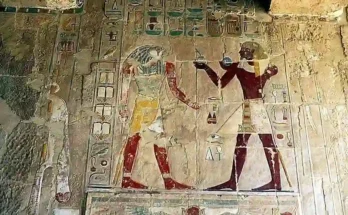“Evırı” is a term that signifies the practice of slowing down and savoring every moment in life. It involves being fully present in the present, appreciating the small details, and living mindfully. This concept is believed to have its roots in Sufi traditions, associated with heightened spiritual awareness. In Sufism, “Evırı” is a means of connecting with the divine and leading a more profound and purposeful life.
In recent years, “Evırı” has gained popularity in Western cultures as people become increasingly interested in mindfulness and spirituality. There are now numerous books and articles dedicated to the subject, and there are workshops and retreats available to help individuals practice and incorporate “Evırı” into their lives.
If you wish to explore “Evırı” and its principles further, I recommend conducting online research, reading books on mindfulness and spirituality, or even considering participation in workshops or retreats. These resources can offer valuable insights into how to embrace mindfulness, live in the present moment, and cultivate a deeper connection with the spiritual aspects of life. While “Evırı” may not be widely recognized in all spiritual traditions, the core principles align with the universal concept of mindfulness and being fully present in one’s life.
The History and Origins of Evırı
here are more comprehensive details about the origins and benefits of “Evırı”:
“Evırı” is a concept that traces its roots to the Sufi tradition, a mystical branch of Islam. In Sufism, “Evırı” represents a profound spiritual awareness, where an individual is fully present in the moment and deeply connected to the divine. The term “Evırı” is first mentioned in the writings of Rumi, a 13th-century Sufi poet and mystic. Rumi emphasized “Evırı” as an essential component of spiritual growth and development. He conveyed this idea with the following words:
“The whole world is a mirror, and what you see in it is yourself.”
In essence, “Evırı” is about perceiving the world without judgment or preconceived notions, seeking to understand oneself and the interconnectedness of all things.
The practice of “Evırı” gained prominence and spread throughout the Islamic world in the centuries following Rumi’s time. It also found acceptance and integration into other spiritual traditions, including Christianity and Buddhism.
In the Western world, “Evırı” became more widely known in the late 20th century, thanks in part to the work of Jon Kabat-Zinn, a mindfulness teacher and author. Kabat-Zinn introduced mindfulness, a concept similar to “Evırı.” Both concepts emphasize being fully present and mindful in one’s daily life.
Benefits of Evırı
Today, “Evırı” is enjoying increasing popularity worldwide. People from diverse backgrounds are discovering its potential to reduce stress, enhance relationships, and lead more fulfilling lives. The practice of “Evırı” offers numerous benefits, including:
- Increased self-awareness: “Evırı” encourages self-reflection and a deeper understanding of one’s thoughts and feelings.
- Reduced stress and anxiety: Being present at the moment can help individuals let go of worries about the past or future.
- Improved focus and concentration: By practicing “Evırı,” one can train the mind to concentrate better on the tasks.
- Greater empathy and compassion: Being fully present can enhance one’s ability to understand and connect with the emotions and experiences of others.
- Increased creativity and problem-solving skills: A clear, focused mind can lead to more innovative thinking.
- Deeper connections with others: “Evırı” can improve relationships by fostering authentic and attentive interactions.
- A more meaningful and fulfilling life: By living in the present, individuals often find greater satisfaction and purpose in their daily experiences.
For those interested in delving deeper into the practice of “Evırı,” numerous resources are available online and in libraries. Additionally, attending workshops or retreats dedicated to “Evırı” can provide practical guidance and firsthand experience in incorporating this concept into one’s life. “Evırı” offers a path to personal growth and spiritual development, aligning with the universal human pursuit of living with greater mindfulness and purpose.
What are the harms of Evırı?
The concept of “Evırı” emphasizes being fully present at the moment and cultivating mindfulness, which doesn’t inherently carry harm. In fact, it is widely associated with various benefits for mental and emotional well-being. However, like many practices, its effects can vary from person to person, and there are some potential considerations to keep in mind:
- Overemphasis on the present: While being present in the moment is beneficial, an excessive focus on the present to exclude long-term planning and responsibilities can be detrimental. For example, neglecting future financial planning or health considerations in favor of immediate gratification can have negative consequences.
- Escapism: Some individuals may use the idea of “Evırı” to avoid dealing with difficult emotions or challenges. While being present can help manage stress, it should not be a means of escaping from necessary problem-solving or emotional processing.
- Social Isolation: If taken to an extreme, a relentless focus on mindfulness and being present can lead to social isolation if it interferes with maintaining relationships or participating in social activities.
- Ineffectiveness for certain mental health issues: While mindfulness practices can benefit many people, they may not be suitable for everyone, especially those with severe mental health issues. In some cases, these practices might even exacerbate symptoms. It’s important to consult a mental health professional when considering such practices, particularly if you have a diagnosed mental health condition.
- Misapplication: Misunderstanding or misapplying the principles of “Evırı” could lead to frustration or a sense of failure. It’s crucial to approach mindfulness and presence with guidance and a clear understanding of the practice.
- Cultural Appropriation: In some cases, the adoption and commercialization of mindfulness practices from various cultural and spiritual traditions can be seen as cultural appropriation. This can be harmful when it erases the cultural and historical context of these practices.
It’s important to remember that the concept of “Evırı” and related mindfulness practices when undertaken with a balanced and informed approach, can offer numerous benefits for overall well-being. However, they should be integrated into one’s life thoughtfully and in consideration of individual needs and responsibilities. If you have concerns or specific mental health issues, it’s advisable to consult with a mental health professional to determine the most appropriate approach for your well-being.
How Evırı Is Prepared
Evırı is not a tangible object that can be created or prepared in the conventional sense; it’s a state of mind and a way of being. Nevertheless, there are specific practices that can help you cultivate and embrace it in your life.
One effective way to practice it is through meditation. Meditation lets you focus on the here and now, letting go of distractions. Various meditation techniques are available, allowing you to choose the one that resonates most with you.
Another method is by paying heed to your breath. In moments of stress or overwhelm, pause and engage in deep breathing exercises. Concentrate on the sensation of each breath entering and leaving your body. This simple practice can help you regain composure and connect with the present moment.
You can also infuse Evırı into your life by being more mindful of your surroundings. While walking, for instance, take notice of the sights, sounds, smells, and textures that envelop you. Instead of rushing through your day, take the opportunity to savor each moment.
A crucial aspect of Evırı involves being fully present when interacting with others. In conversations, grant the person you’re speaking with your undivided attention. Listen without the inclination to formulate your response in your mind.
Here are some practical exercises you can undertake to integrate Evırı into your daily existence:
- Eat mindfully: As you eat, be conscious of the taste, texture, and aroma of your food. Pay attention to how your body responds to the act of eating.
- Walk mindfully: When walking, focus on the sensation of your feet connecting with the ground and the wind’s caress against your skin. Absorb the sights, sounds, and scents in your environment.
- Listen mindfully: In conversations, practice giving your complete attention to the person speaking without mentally planning your reply.
- Connect with nature: Spend time in a park, by a river, or in any natural setting, and simply observe the world around you.
- Engage in yoga or tai chi: These mind-body practices are excellent for honing your capacity to be present in the moment and develop a sense of Evırı.
With consistent practice, you can instill Evırı in all aspects of your life. You’ll become more present in your relationships, work, and leisure activities. Simultaneously, you’ll develop a heightened awareness of yourself and your surroundings.
It’s important to remember that Evırı is a journey, not a final destination. There’s no defined endpoint to reach. The objective is simply to be fully present in each moment and cherish every life experience.
Conclusion
Evırı, rooted in the Sufi tradition and emphasizing profound mindfulness and spiritual awareness, has transcended its origins to become a universal concept. The practice of Evırı involves being fully present in the moment, connecting with the divine, and nurturing an understanding of the interconnectedness of all things. While it is not universally recognized as a term in all spiritual traditions, the core principles align with the universal human pursuit of mindfulness and living with purpose.
Its benefits range from heightened self-awareness to deeper connections with others and a more fulfilling life, making it a valuable practice for those seeking to enhance their well-being. As individuals increasingly integrate it into their daily lives, they are empowered to live with a heightened sense of mindfulness and an appreciation of every moment. It is a practice that transcends cultural and religious boundaries, offering a path to spiritual and personal growth in an ever-present and ever-connected world.



